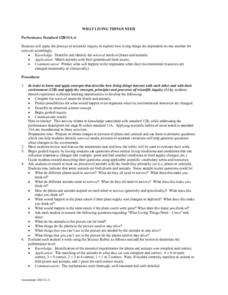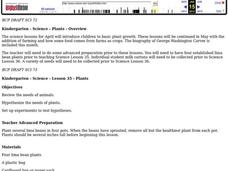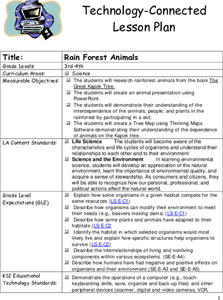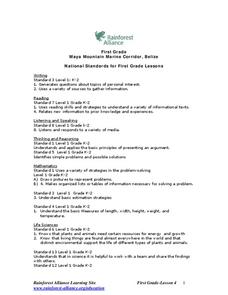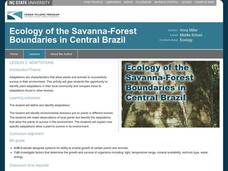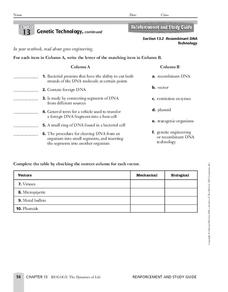Curated OER
Sedimentary Rocks
Fourth graders discuss the basic properties of rocks, the processes
involved in the formation of soils, and the needs of plants provided by soil. They write descriptions in their Science journal and identify and discuss each type of...
Curated OER
What Living Things Need
Students apply the process of scientific inquiry to explore how living things are dependent on one another for survival. They match animals with their generalized food source. Students predict what happens to the organisms when their...
Curated OER
How a Seed Grows and Who Grows It
First graders explore biology by viewing PowerPoint presentations in class. In this plant life lesson, 1st graders identify the life cycle of a plant and how to properly plant a seed outside. Students view a movie about plant life and...
Curated OER
Little Red Hen
First graders explore biology by identifying plant anatomy in class. In this botany lesson, 1st graders read the book The Little Red Hen and identify the methods used in order to grow successful plants. Students discuss other ways people...
Curated OER
Hula Hoop Habitats
Students explore migration. In this science activity, students play a game in which they explore bird migration. Students discuss the needs of birds and play a game in which they "migrate" in order to meet their needs.
Curated OER
Habitats
Students identify butterfly habitats. In this butterfly habitats lesson plan, students read and discuss Where Butterflies Grow. Students study pictures and guess which are butterfly habitats. Students list the life needs of butterflies...
K5 Learning
The Life Cycle
Studying plant, animal, or insect life cycles? Pair a science unit with a reading comprehension worksheet on life cycles. The passage touches briefly on butterfly, plant, frog, and dog life cycles before prompting readers to answer six...
Curated OER
Exploring Biomes Lesson 5: You Need a Vacation
In cooperative groups, emerging ecologists research assigned biomes found in Arizona. Combining photos and facts, they use PowerPoint to produce a fully automated commercial that lasts 45 seconds. In addition to the lesson outline,...
Biology Junction
Kingdom: Fungi
Based on DNA, fungi relate more closely to animals than to plants. This new scientific knowledge shifted the world view of scientists and opened up new classifications. Viewers learn about fungi's place in evolution, in the tree of life,...
Biology Junction
Protists and Fungi
It's alive, but what is it? Protists share similarities with plants, animals, and fungi without being classified as any of those three. Learn more about protists and the kingdom fungi with a short presentation. It describes the parts of...
Curated OER
Plants
Students review the needs of animals, hypothesize the needs of plants, and set up experiments to test hypotheses.
Curated OER
Sunken Millions
This PowerPoint features a game based on the animal life. The interactive slides include 20 questions about animal needs, animal groups, and animal traits. The questions include multiple choice answers and 4 different levels of...
Curated OER
Rain Forest Animals
Pupils research rainforest animals from the book The Great Kapok Tree. They create an animal presentation using PowerPoint. Pupils demonstrate their comprehension of the interdependence of the animals, people, and plants in the...
Curated OER
The Way a Tree Works
Students explore nature by conducting botany experiments. For this plant life lesson, students define the necessary resources for a plant to thrive on our planet while defining scientific vocabulary terms. Students utilize different...
Curated OER
Key Figures of the 1899 Harriman Alaska Expedition
Pupils gain general knowledge of the goals, route, participants, and significance of the 1899 Harriman Expedition. They link names of glaciers, fiords, mountains, flora and fauna with names of the 1899 Harriman Expedition participants. ...
Curated OER
Solve the Case!
Students discover the habits of panthers by solving fictitious crime mysteries. In this animal life lesson, students utilize their research from previous lessons to solve mysteries in a panther activity. Students answer questions about...
Curated OER
Goods for You!
Students define "goods" and "services" and identify examples of both. They read farm books and discuss what we use from animals and plants on a farm. They observe the Wisconsin quarter reverse and locate Wisconsin on a map.
Curated OER
Who Takes Care of the Maya Forest Corridor?
First graders study the animals in the Maya Forest Reserve. In this conservation lesson plan, 1st graders create a graph to compare the environment of animals to their own. They design a 3D model of these two environments.
Curated OER
Adaptations
Sixth graders identify plant adaptations. In this adaptations lesson, 6th graders use digital cameras to photograph plants found on their campus. Students describe the adaptations for each plant.
Curated OER
Case of the Missing Pumpkin
Students explore the process of decomposition in plants. For this plant biology lesson, students use a cleaned out pumpkin and observe how the decomposition process takes place. Students write down adjectives to describe the pumpkin.
Curated OER
The Magic School Bus Gets Eaten
Students learn along with Ms. Frizzle's class. In this Magic School Bus lesson plan, students eat while they act as links in the food chain. Popcorn bags stand for food energy that is passed along the links in a food chain from the sun,...
Curated OER
Genetic Technology
In this genetic worksheet, students will match 6 terms associated with gene engineering to their correct definition. Then students will complete a table indicating if the vector is mechanical or biological. Finally, students will...
Curated OER
Biology: Cells and Chemical Changes
Students explore the numerous functions of cells in both plants and animals. Following a pre-assessment, they construct cell models and examine onion cell slides stained with iodine or dye. After participating in experiments on how to...
Curated OER
Plants
Students plant bean seeds and draw pictures of the plants as they grow. They create their own garden, plant the seeds, and keep a journal of their growth.



